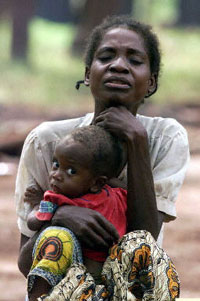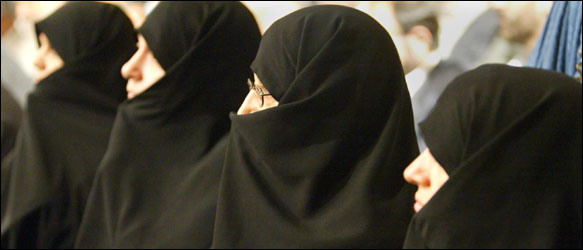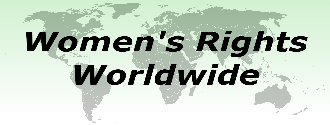NOTE: WomensRightsWorldwide.org is not an NGO or other type of organization. At this time, it is simply a website designed to raise awareness of the issue of women's rights abuses around the world. Anyone interested in developing an organization with the name Women's Rights Worldwide, can contact the Editor.
"Thank Heaven for Little Girls" - The lyrics to Maurice Chevalier�s most enduring song describe an idyllic view of little girls and the women they become. There is much in our art and literature that romanticizes girls and women and the role they play in our culture. But sadly, in our world today, being female often means being sentenced to a life of poverty, abuse, exploitation, and deprivation. Compared to her male counterpart, a girl growing up in the developing world is more likely to die before her fifth birthday and less likely to go to school. She is less likely to receive adequate food or health care, less likely to receive economic opportunities, more likely to be forced to marry before the age of 16, and more likely to be the victim of sexual and domestic abuse. Girls are forced to stay home from school to work. In fact, two thirds of the nearly 800 million illiterate people in the world are women. Only one in 10 women in Niger can read. Five hundred thousand women die every year from childbirth complications� that�s one woman every minute. Girl babies are even killed in countries where males are considered more valuable. Women are denied property rights and inheritance in many countries. Worldwide, women own only 1 percent of the world�s property. They work two-thirds of all the world�s labor hours but earn just 10 percent of the world�s wages. Being female, in much of our world, is not �heavenly.� And yet, in my opinion, the single-most significant thing that can be done to �cure� extreme poverty is this: protect, educate, and nurture girls and women and provide them with equal rights and opportunities�educationally, economically, and socially. According to U.N. Secretary-General Kofi Annan: �No tool for development is more effective than the empowerment of women.� This one thing can do more to address extreme poverty than food, shelter, health care, economic development, or increased foreign assistance. There is a saying in Ghana: �If you educate a man, you simply educate an individual, but if you educate a woman, you educate a nation.� When a girl is educated, her income potential increases, maternal and infant mortality is reduced, her children are more likely to be immunized, the birth rate decreases, and HIV infection rates (especially in Africa) are lowered. She is more likely to acquire skills to improve her family�s economic stability, and she is more likely to ensure that her daughters also receive an education. Educating girls pays dividend after dividend to the whole community. - World Vision Magazine - Spring 2007
Men, being physically stronger than women (in general), have exploited this advantage over the centuries to mold societies, religions, and traditions which are, in many cases, advantageous and convenient for men, but oppressive and abusive to women. Let us expose these inequities for what they are and begin the process of restoring fairness to all societies.
We believe that all women have certain inalienable rights that cannot be legitimately withheld under the guise of religious or cultural "laws" or "traditions".
"Thank Heaven for Little Girls" - The lyrics to Maurice Chevalier�s most enduring song describe an idyllic view of little girls and the women they become. There is much in our art and literature that romanticizes girls and women and the role they play in our culture. But sadly, in our world today, being female often means being sentenced to a life of poverty, abuse, exploitation, and deprivation. Compared to her male counterpart, a girl growing up in the developing world is more likely to die before her fifth birthday and less likely to go to school. She is less likely to receive adequate food or health care, less likely to receive economic opportunities, more likely to be forced to marry before the age of 16, and more likely to be the victim of sexual and domestic abuse. Girls are forced to stay home from school to work. In fact, two thirds of the nearly 800 million illiterate people in the world are women. Only one in 10 women in Niger can read. Five hundred thousand women die every year from childbirth complications� that�s one woman every minute. Girl babies are even killed in countries where males are considered more valuable. Women are denied property rights and inheritance in many countries. Worldwide, women own only 1 percent of the world�s property. They work two-thirds of all the world�s labor hours but earn just 10 percent of the world�s wages. Being female, in much of our world, is not �heavenly.� And yet, in my opinion, the single-most significant thing that can be done to �cure� extreme poverty is this: protect, educate, and nurture girls and women and provide them with equal rights and opportunities�educationally, economically, and socially. According to U.N. Secretary-General Kofi Annan: �No tool for development is more effective than the empowerment of women.� This one thing can do more to address extreme poverty than food, shelter, health care, economic development, or increased foreign assistance. There is a saying in Ghana: �If you educate a man, you simply educate an individual, but if you educate a woman, you educate a nation.� When a girl is educated, her income potential increases, maternal and infant mortality is reduced, her children are more likely to be immunized, the birth rate decreases, and HIV infection rates (especially in Africa) are lowered. She is more likely to acquire skills to improve her family�s economic stability, and she is more likely to ensure that her daughters also receive an education. Educating girls pays dividend after dividend to the whole community. - World Vision Magazine - Spring 2007
Men, being physically stronger than women (in general), have exploited this advantage over the centuries to mold societies, religions, and traditions which are, in many cases, advantageous and convenient for men, but oppressive and abusive to women. Let us expose these inequities for what they are and begin the process of restoring fairness to all societies.
We believe that all women have certain inalienable rights that cannot be legitimately withheld under the guise of religious or cultural "laws" or "traditions".
The Right.....
- to not be physically mutilated
- to not be killed in the name of "honor"
- to not be forced to perform or submit to sexual acts
- to choose whether or not to become pregnant
- to equal education
- to have an equal vote
- to be literate
- to not be forced to labor without pay
- to choose their own religion, or lack thereof
- to have equal access to medical care
- to have equal driving privileges
- to leave their home as they wish
- to leave their country
- to choose a career
- to choose their own mate
- to leave their mate
- to take legal action against their mate or any citizen
- to choose their own clothing
- to be treated equally under the laws of their country
- to listen to or perform the music of their choice
- to read or write what they choose
- to view or create art of their choice
- to have the same freedoms as others (men) in their society
- to have free and equal access to information
- to own property
- to hold public office
- to enter into legal contracts



